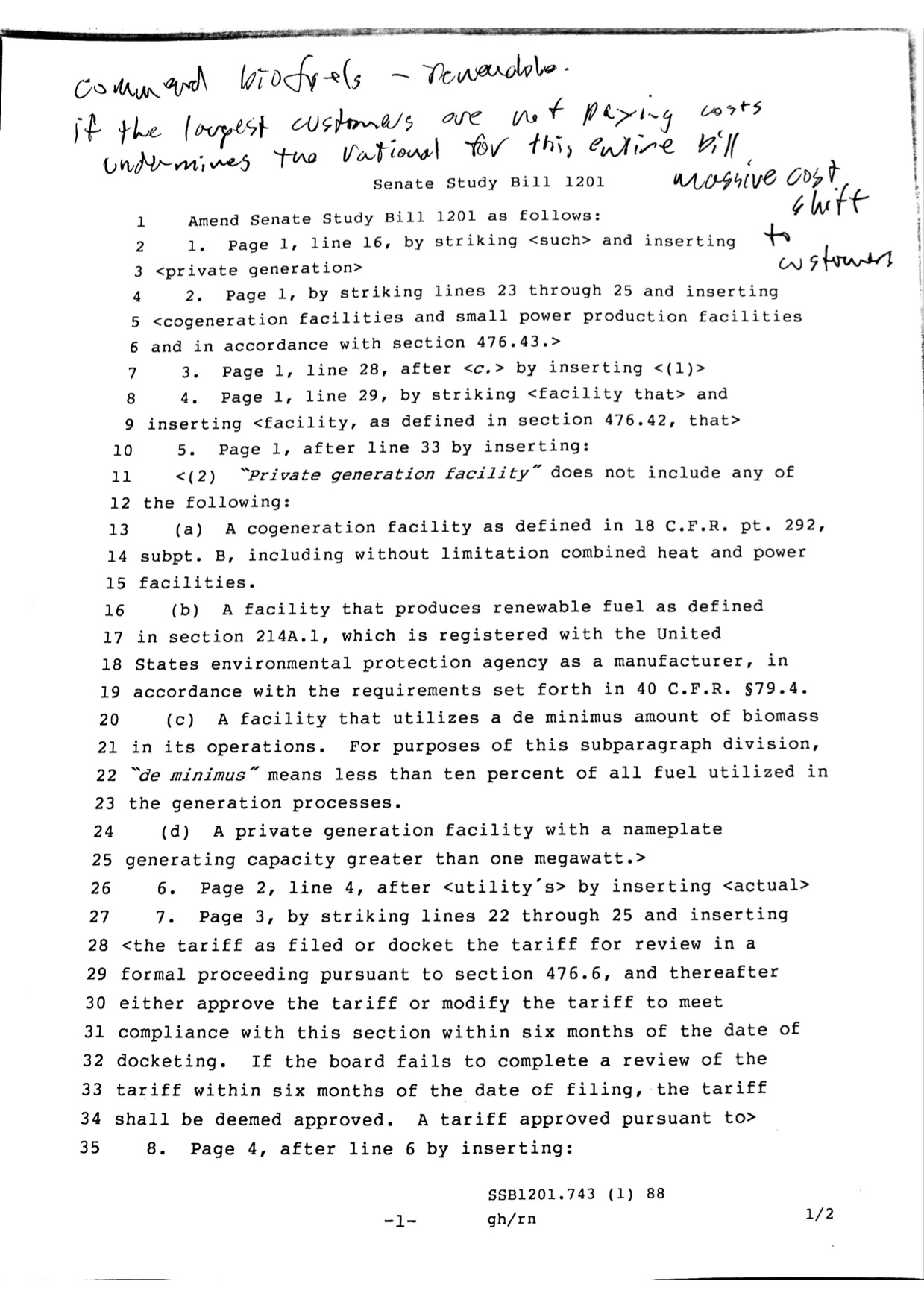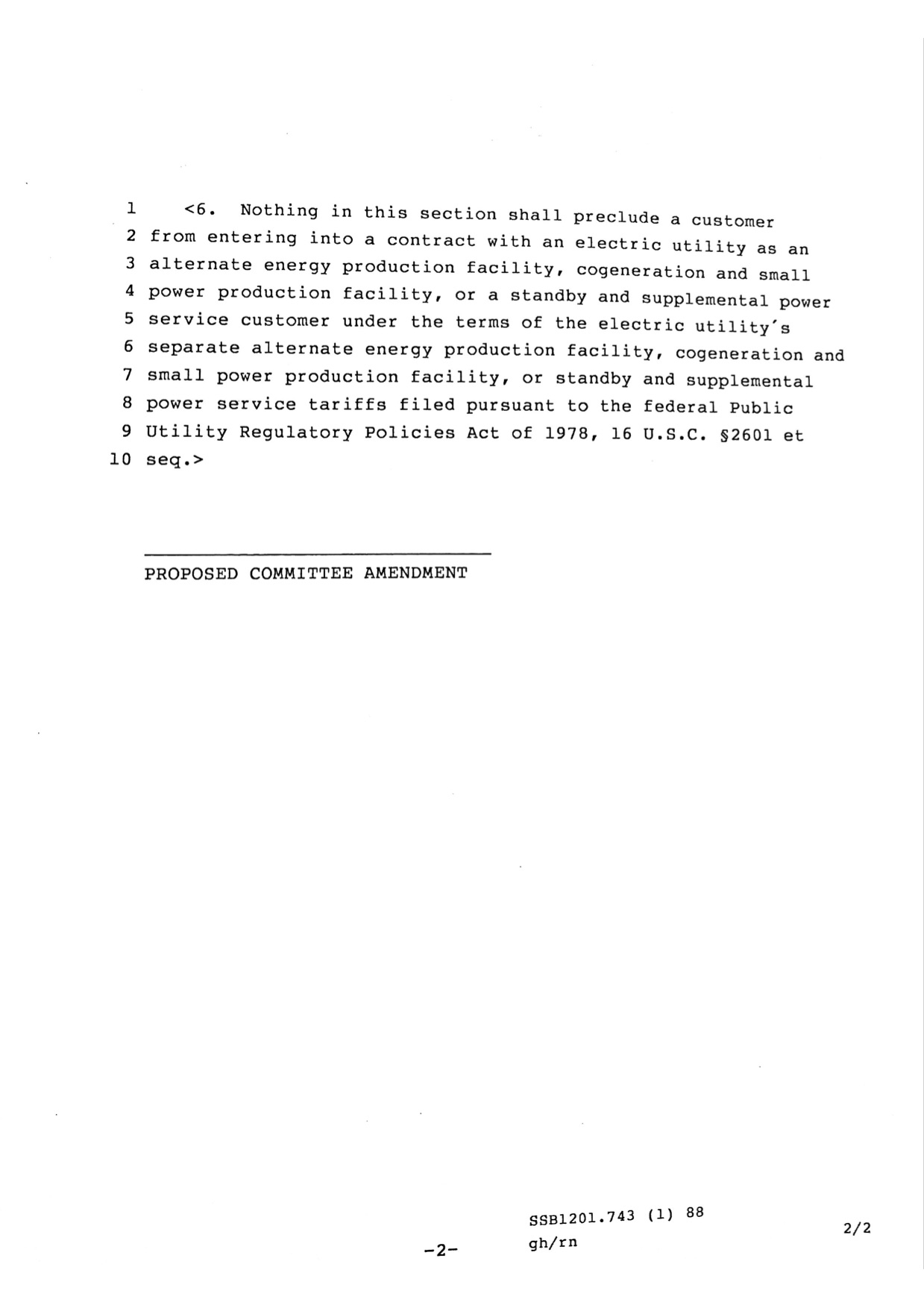MidAmerican Energy’s effort to crush small-scale solar generation made it through the Iowa legislature’s first “funnel” and will be eligible for floor debate in both chambers. The House Commerce Committee on March 4 approved House Study Bill 185 (now renamed House File 669) without amendment on a party-line 12 to 10 vote. The Senate Commerce Committee amended the companion Senate Study Bill 1201 before advancing it on March 7.
The bill will likely pass the upper chamber, where Republicans have a 32 to 17 majority. Although Republicans outnumber Democrats by 54 to 46 in the House, and MidAmerican’s political action committee donated to dozens of incumbents’ campaigns last year, getting the solar bill through the lower chamber will be no easy task. A utility-backed bill to undercut energy efficiency programs was one of the heaviest lifts during the 2018 session. Only after several concessions did supporters cobble together 52 Republican votes in the House. The GOP held 59 seats at that time.
More than three dozen corporations, industry groups, or advocacy organizations have lobbyists registered for or against MidAmerican’s solar bill. While it’s not unusual for a high-profile bill to draw that kind of attention, the two camps seeking to persuade legislators on this issue reflect alliances rarely seen at the statehouse.
CORPORATE MONOPOLIES, BUSINESS GROUPS…AND ORGANIZED LABOR
The sixteen entities registered for MidAmerican’s bill at this writing fall into three categories.
Utilities and related industries
MidAmerican Energy, a monopoly provider to hundreds of thousands of Iowans, helped write the bill and was the first to have lobbyists sign on, right after the text was published on February 20. The following day, the Iowa Association of Municipal Utilities registered in favor. As monopoly providers in many Iowa communities, municipal utilities also benefit from limiting “distributed generation” by small-scale users of solar or wind power.
The Central Iowa Power Cooperative, Iowa Association of Electric Cooperatives, and ITC Midwest (which operates transmission lines) are also supporting the bill.
Mouthpieces for big business
Four organizations that typically favor whatever large corporations want are lobbying for the solar bill too.
I asked representatives from the Greater Des Moines Partnership why they are backing a bill that would in effect block small businesses from using solar power to reduce future energy costs. Joe Murphy, the partnership’s senior vice president of government relations and public policy, provided this statement.
The Partnership has supported pro-renewable energy policies for many years as part of our state legislative agenda. Iowa needs a pro-growth statewide policy that allows solar energy to thrive in the same way that wind energy has for many years in our state. We’ve seen tremendous economic development benefits from our innovative focus on wind energy and we can continue that pattern of new business growth, rural development, new jobs growth and more by supporting the SOLAR Act.
First glaring flaw in that reasoning: the initial growth of wind energy stemmed from net metering policies the Iowa Utilities Board adopted during the 1980s. MidAmerican boasts about its large-scale wind farms now, but the company had to be dragged kicking and screaming to invest in renewables. With state policy resembling the current proposal, the industry might never have gotten a strong foothold in Iowa, because it would not have been economical for smaller users to install wind turbines.
Second glaring flaw in the Partnership’s logic: MidAmerican presented similar arguments to the Iowa Utilities Board a few years ago, when that board invited comments on distributed generation, including “the benefits and challenges” for utilities. The three-member utilities board, composed entirely of corporate-friendly Terry Branstad appointees, rejected the idea of imposing new charges on solar users and concluded that “additional information is needed in order to move forward with the implementation of changes to net metering.” To that end, the board ordered MidAmerican and Iowa’s other investor-owned utility Alliant to set up pilot net metering projects, which won’t be completed for more than a year.
During the March 4 House Commerce Committee meeting, Democratic State Representative John Forbes called for putting off any policy change until lawmakers can review the results of the utilities’ net metering pilot projects. Neither MidAmerican nor its allies have provided any compelling reason to pass this bill now.
Labor and groups benefiting from construction projects
MidAmerican is rumored to be planning to build a large solar array if state lawmakers approve and Governor Kim Reynolds signs this bill. That is presumably why SSAB, formerly known as IPSCO Steel, is registered for the legislation.
Six organized labor groups are also supporting the effort:
I sought comment from most of the lobbyists representing labor unions. Iowa stands to lose hundreds of middle-class jobs for solar installers under MidAmerican’s proposal. If this bill were good for working people, wouldn’t the Iowa Association for Business and Industry and Americans for Prosperity be against it?
The only lobbyist to respond to my inquiry was Threase Harms, who provided this statement on behalf of IBEW State Conference President Patrick Wells.
This bill does not diminish the ability for the development and/or use of solar energy. A sound infrastructure is critical to the distribution of all sources of energy. Building and maintaining that infrastructure requires resources. Currently, private generation customers benefit from the sale of their excess energy but burden none of the costs associated with building and maintaining the lines it goes out on. That cost falls back onto all other customers. As private generation grows, this system will become less sustainable, either further increasing the costs to all consumers or creating deficiencies in the integrity of the infrastructure through lack of resources which in turn will compromise jobs. This bill gives the utility the ability to justly recover costs associated with the distribution of power from those who choose to benefit from the generation of excess power for distribution back onto the grid. This will help keep costs down and maintain the ability to ensure a sound infrastructure going forward.
Notice how closely Wells’ comment tracks with the dark money ads promoting this bill and what MidAmerican’s spokesperson told me last month:
Today, not all electric grid users pay for the costs that support the electric grid that serves all customers. […]
Under current state policy, private generators don’t always pay grid costs, which creates the cost shift. The SOLAR Act would address the customer fairness issue by eliminating the shifting of costs from one customer onto another, while maintaining the affordable and predictable energy that Iowans expect and deserve. With the passage of the SOLAR Act, Iowa can capitalize on a policy that will encourage solar growth through community solar, subscription-based solar and utility-scale solar, while also advancing private generation in a responsible and fair way. […]
Iowa’s current policy creates a subsidy that forces customers who don’t have private generation to pay for those who do. We support customers having private generation, but not the cost shift that’s created when they don’t pay for their use of the grid. […]
The Cedar Rapids Gazette’s James Q. Lynch reported on last month’s House subcommittee meeting.
[F]ormer Senate Majority Leader Mike Gronstal said the bill would “usher in a dramatic era in solar energy.” He disputed earlier claims that solar generators are already contributing to the cost of maintaining the grid. Their monthly service charge only covers the cost of the electric meter and billing, he said.
This bill is an excellent case study in how labor unions are not always reliable progressive allies. During the past two years, no environmental organizations gave cover for corporate-backed Republican bills that hurt working Iowans by reducing their wages or workers’ compensation benefits or collective bargaining rights. But when large companies want to build environmentally destructive pipelines, some labor unions become loud boosters, echoing exaggerated projections on job creation.
Now we see labor advocates regurgitating talking points that “rely on average Iowans not understanding how the grid works.” It would be more refreshing for them to admit they don’t mind if MidAmerican monopolizes future solar power development here. Most of the 800 estimated jobs in Iowa’s solar industry, which will be at risk if this bill passes, are not union jobs.
I was relieved that all Democrats on the House Commerce Committee opposed House Study Bill 185 on March 4. I haven’t heard of any Senate Democrats supporting this bill either. CORRECTION: Democratic Senators Liz Mathis and Jim Lykam voted the bill out of Senate committee.
Labor lobbying can put Democratic legislators in a difficult position; that’s the main reason U.S. Representative Dave Loebsack occasionally voted for bad Keystone XL pipeline bills.
Even if labor lobbyists can’t deliver many Democratic votes on this issue, their backing could help MidAmerican if it dissuades Democrats from putting up a big fight during House or Senate floor debate.
SOLAR INDUSTRY, ENVIRONMENTAL ADVOCATES…AND BIG AG
Twenty-one entities are registered against MidAmerican’s bill. They fall into three categories:
Solar industry or companies using solar panels
MidAmerican’s bill threatens businesses that install PV systems as well as their potential customers.
The last two groups registered against the bill on March 6. Changing current net metering policy would in effect prevent school districts from installing solar panels on school buildings, which often have high energy costs and tend to have large, flat roofs.
Environmental advocates
The Iowa Environmental Council and Environmental Law and Policy Center were first to register against House Study Bill 185, within hours of its publication on February 20. Other groups working on related issues have since joined the fight:
I put the Iowa Farmers Union in this category, because more often than not that group aligns with environmental advocates, not industry groups representing conventional agriculture.
Heavy-hitters in the agricultural sector
When the Iowa legislature considers water quality or soil conservation bills, the environmental community and leading voices for Big Ag land in opposite camps. But some biofuels companies and many farmers with confined-animal feeding operations (CAFOs) have installed solar panels to reduce costs in an energy-intensive business. Largely for that reason, the following four entities registered against MidAmerican’s bill:
Those players have a lot of pull with Republican lawmakers.
During the Senate Commerce Committee’s March 7 meeting, Republicans adopted an amendment (enclosed below) that exempts the following types of operations from additional costs: cogeneration facilities producing combined heat and power; renewable fuel producers registered with the U.S. Environmental Protection Agency as manufacturers; facilities that use less than 10 percent biomass; and private generators with a capacity greater than one megawatt (larger than any home or small business).
Kerri Johannsen, energy program director for the Iowa Environmental Council, provided this comment to Bleeding Heartland on the special carve out for big players.
The amendment adopted in today’s Senate Commerce Committee highlights a big problem with MidAmerican’s claim that customers with distributed generation are increasing costs for other customers. If that were the case, it would make absolutely no sense to exempt the largest customers from the new policy. While we agree that the exempted types of projects are valuable and should be able to net meter, it is incredibly unfair to small businesses, farmers, communities, churches, schools, and individuals who want to make their own investments in solar generation.
Distributed solar has measureable benefits for all customers and all customers should be fairly compensated. This amendment makes it even more clear that MidAmerican’s intent is not to “solve” an issue of one customer subsidizing another, but to kill Iowa’s growing, independent solar industry and shut down customer choice.
MidAmerican did not respond to Bleeding Heartland’s inquiry about the Senate amendment, which undermines the company’s stated case for the bill (the so-called “cost shift” to other grid users). UPDATE: Tina Hoffman, director of corporate communications for the utility, sent the following comment on March 9.
Co-generation customers already take service under a multi-part rate as their standard rate. The demand charge they pay as a part of their standard rate already covers their infrastructure cost. The amendment simply clarified that difference. The rate for private generators – who are almost exclusively residential customers and small commercial customers – is a two-part rate that doesn’t recover infrastructure costs if the private generation equals the customer’s usage.
While the amendment makes no sense if you accept MidAmerican’s rhetoric at face value, it’s a brilliant tactical move. When last year’s big energy bill stalled in the Iowa House, backers amended the legislation to remove a proposed new energy efficiency fee on solar customers. That change prompted the Pork Producers to switch their lobbyists from “against” to “undecided,” which shook loose a few Republican votes.
The Senate amendment is a transparent bid to get the Pork Producers and biofuels industry to drop their opposition to MidAmerican’s bill. At the close of business on March 8, all four big ag interests listed above are still registered against the Senate version. Watch this space, though.
Bleeding Heartland welcomes tips on other bills that have created unusual alliances in the lobby.
*UPDATE: The Iowa Renewable Fuels Association lobbyists switched to “undecided” first thing in the morning on March 9.
LATER UPDATE: Bills often receive new numbers after committee approval. MidAmerican’s solar bill is now known as House File 669 or Senate File 583.
The Iowa Renewable Fuels Association and Archer Daniels Midland are registered undecided on the Senate bill and against the unamended House bill. The Pork Producers are still opposing both versions. The Biodiesel Board has not registered on the renumbered bills.
https://www.legis.iowa.gov/lobbyist/reports/declarations?ga=88&ba=SF583
Appendix: Amendment to Senate Study Bill 1201, adopted before Republicans on the Iowa Senate Commerce Committee voted to advance the bill on March 7




5 Comments
Thanks, again
So much work goes into your posts. I bet even legislators learn a lot when they read them. They should recognize you as a real news reporter.
iowavoter Fri 8 Mar 9:42 PM
thanks
Legislators have sometimes told me they learned from my work.
Laura Belin Fri 8 Mar 10:47 PM
I am kind of drop-jawed...
…by all the things I’ve learned from this post. So it turns out I agree with the Iowa Pork Producers Association about something, at long last. And my opinion of the Greater Des Moines Partnership, always tentative, just went way down. If you’re going to lobby for a bozo bill like this, at least provide an explanation that isn’t intelligence-insulting.
PrairieFan Fri 8 Mar 11:58 PM
the Pork Producers
were big supporters of extending the solar tax credit as well.
Laura Belin Sat 9 Mar 6:32 PM
Thank you, that is interesting too.
I also wonder what MidAmerican Energy has in mind for their “large solar array” in terms of siting, size, design, etc. Their record so far does not inspire trust.
PrairieFan Sun 10 Mar 1:41 AM